Israel-Hamas War: What happened on Day 115?
Israel nearing Khan Yunis victory • Israeli security delegation lands in Cairo •
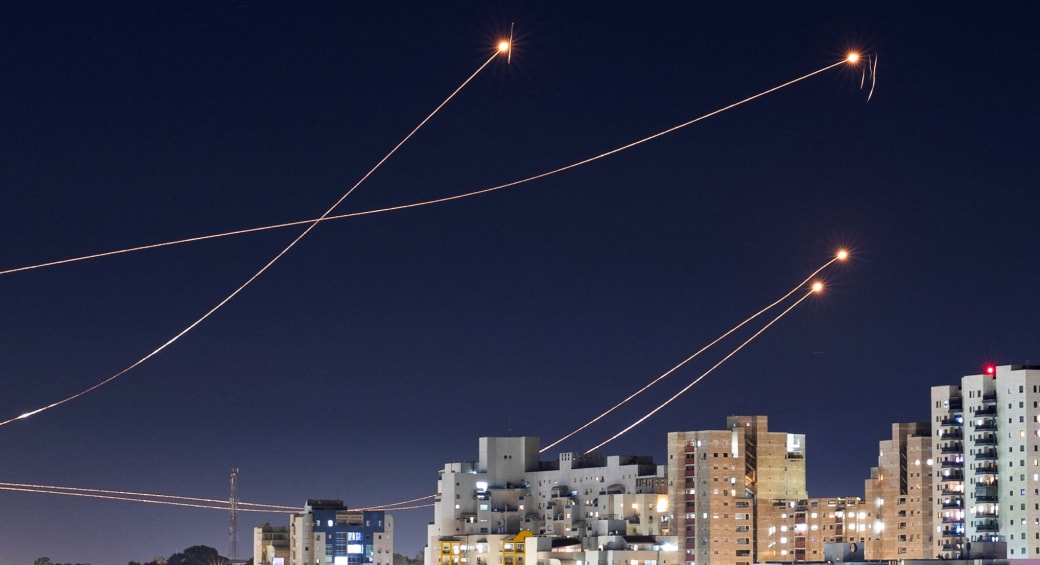

Hamas rejects hostage deal - report
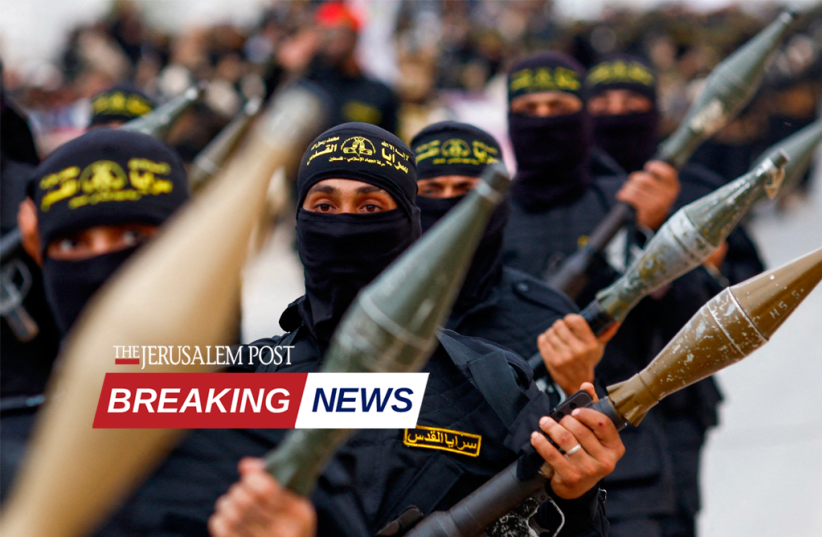
Following reports of an upcoming hostage deal, Hamas has rejected the proposal, Israeli media reported on Monday.
Go to the full article >>Rafah Crossing issue makes Egypt 'bad guy' in Arab world
Videos have been circulating online of Gazans imploring Egyptian soldiers to let them pass, and reports of bribing Egyptian soldiers into letting Gazans out of the strip have begun to appear.
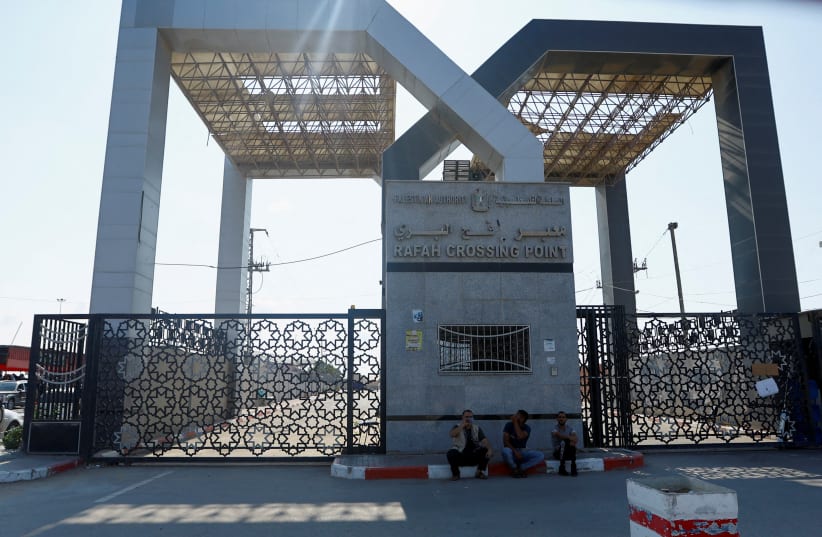
Spectators strolling these days through Cevdet Paşa boulevard in Istanbul will encounter unusual displays and loud demonstrations in front of the Egyptian consulate in the city. Some days it’s a faceless statue of bird in a cage; in others it’s a closed gate separating between medical equipment and food on one side – and corpses-shaped shrouds and artificially ventilated children on the other.
In all cases, two words will adorn the metaphorical “obstacles for freedom”: “Refah Kapısı”, Rafah gate. These displays and demonstrations are broadcast daily by Qatari Al-Jazeera and Turkish TRT, in an attempt to throw slime at Egypt and accuse the largest Arab country of surrendering to Israeli demands and not making sure that the Rafah border crossing is open to bring in aid and bring out the wounded from Gaza.
Noticeably, the Rafah border crossing plays an additional trump card for forces opposed to Egypt on the regional level, as Turkey, Qatar and Hamas are all allied as part of the Muslim Brotherhood axis, while Egypt outlawed the Brotherhood roughly one decade ago following the ousting of President Mohammed Morsi, the Muslim Brotherhood’s candidate, and in line with most of the eight decades of the history of the modern Arab Republic of Egypt, in which a secular, military leadership traditionally showed inherent disdain for the Muslim Brotherhood, its ideologies, its members and its political structure.
The situation at the Rafah border crossing
The Rafah border crossing is the only official point of access between Egypt and the Gaza strip. Located in the southern-central part of the roughly 14-kilometer-long border, it serves as a gateway between the namesake towns of Rafah on both sides of the border.
Photos from the past few days have shown tents of evacuees from the northern part of the Gaza strip essentially touching the fence in the new tent neighborhood of Gazan Rafah; while the Egyptian side also took measures to make sure no Gazans would make it past the border, building a series of mounds, fences and other fortifications between the two sides to keep away unwanted refugees.
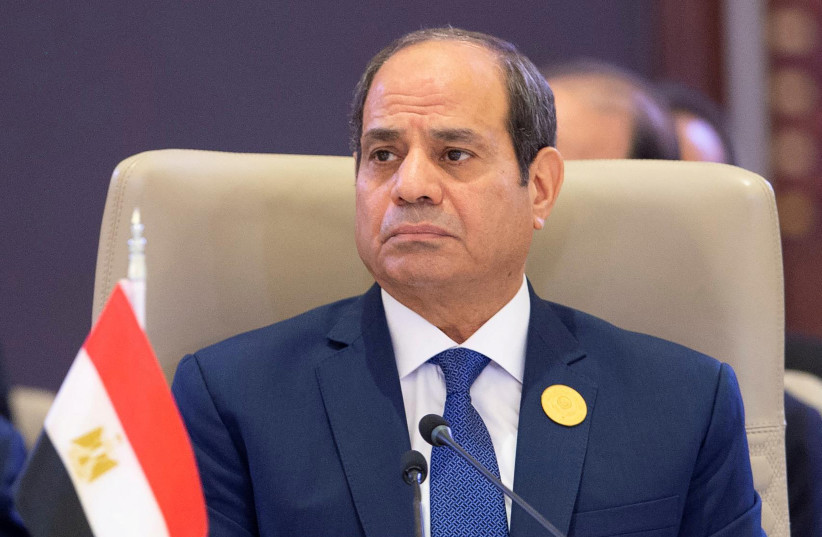 Egypt's President Abdel Fattah al-Sisi attends the Arab League Summit in Jeddah, Saudi Arabia, May 19, 2023 (credit: BANDAR ALGALOUD/COURTESY OF SAUDI ROYAL COURT/HANDOUT VIA REUTERS)
Egypt's President Abdel Fattah al-Sisi attends the Arab League Summit in Jeddah, Saudi Arabia, May 19, 2023 (credit: BANDAR ALGALOUD/COURTESY OF SAUDI ROYAL COURT/HANDOUT VIA REUTERS)The Gazan side of the crossing changed hands officially several times, from Israel to the Palestinian Authority to Hamas; sometimes also under European supervision and other times completely shut due to security issues; and always subject to changes as quadrilateral relations between Egypt, Hamas, the Palestinian Authority and Israel see ups and downs.
Although Egyptian president Abdul Fatah Al-Sisi claimed several days ago that 600 trucks of aid pass through the crossing daily, the crossing is nevertheless under constant scrutinization by Egypt’s adversaries, located at the epicenter of a global campaign to pressure Egypt, not Israel, into bringing in more aid and getting more Gazans out.
As of lately, videos have been circulating online of Gazans imploring Egyptian soldiers to let them pass, and reports of methods to bribe Egyptian soldiers into letting Gazans out of the strip began to appear.
And, indeed, an article published by Le Monde three days ago exposed a network of brokers and agencies who sell permits for exorbitant prices of thousands of dollars per person in order to exit the Gaza strip.
Some reports by critics of the Al-Sisi regime have made allegations that the Rafah crossing, as well as these other agencies, are run by Ibraheem Al- Argani, a prominent businessman and tribal leader in the Sinai peninsula, who also happens to be a close friend of Al-Sisi and presumably a member of the Egyptian intelligence services.
This indirectly implicates El-Sisi’s close circle of profiting from the plight of Gazans. Some relatives of Gazans even started GoFundMe campaigns to help their families leave the Gaza strip and make it to safety.
Some Gazans, however, seem to be lucky enough to exit the Strip through special invitations or contacts. The most prominent of those was Wael Al-Dahdouh, director of Al-Jazeera’s office in Gaza, who was flown to Doha a couple of weeks ago following years of reporting from Gaza for the Qatari mouthpiece and especially harsh hardships during the past war, including losing family members such as his son – also revealed by the IDF spokesman to be a militant from the Palestinian Islamic Jihad movement aligned with Iran.
Another influencer who made it past the gates all the way to Doha was Motaz Azaiza, a Gazan influencer and journalist who broadcasted from within Gaza during the war and gained a large following, showing the close relations of media personnel in Gaza with the same government who provides asylum and a safe haven for the leaders of the terror group Hamas in Doha.
Online campaign to pressure Egypt
The hardships at the crossing also brought with them a viral online campaign under the hashtag “Open the Rafah Crossing” in Arabic is currently underway.
This campaign apparently gained track when Osama Gaweesh, a UK-based journalist originally from Egypt and a hardline critic of the Al-Sisi regime, simply tweeted the hashtag earlier this month, later adding in another tweet: “as an Egyptian citizen, I apologize to all our people in Gaza.
Shortly after that, in mid-January, a rather spontaneous rally convened at the Egyptian Journalists’ Syndicate headquarters in Cairo, where protesters chanted “there’s a crossing between us and our families, the Zionist is controlling us”, “as long as Arab blood is cheap – let any president fall!” and “we want the crossing open!”
The campaign then spread virally with thousands of appearances over the past few weeks and a potential reach of millions of users across the Arab speaking sphere. A recent participant who joined this already trending campaign, and who may be deemed surprising, is no less than the BDS movement, more specifically their Arabic speaking outlets. While usually directed at Israel, the past days have seen an uptick in the movement’s attempts to apply pressure on the Egyptian government as well.
In one post, the movement accused that, while “The Israeli enemy places the responsibility for preventing the entry of aid into the Gaza Strip on Egypt… response from the Egyptian authorities is insufficient to deny the accusation of (Egyptian) participation in genocide,” wondering: “Does the ambiguity of the current situation between Egypt and Israel regarding the Rafah border crossing reflect their joint coordination, and therefore shared responsibility (for genocide)?”
Al-Sisi’s response and Gazans unconvinced
In an attempt to reduce pressure, Egyptian President Abdul Fatah Al-Sisi said in a speech he delivered last week that “If I were the reason for not bringing in a loaf of bread to Gaza – where would I run from my creator? The Rafah border crossing is open 24 hours a day, seven days a week… however, measures taken by the other side, by Israel, to allow us to bring in (aid) without anyone opposing it – that is the reason for this (problem)," he said.
"It’s a form of pressure (from Israel) on the Strip and its residents because of the conflict between them regarding the subject of the release of hostages," he continued, "Meaning, they use this as a means of pressure on the population."
This remark may refer to Israel’s addressing Egypt as the sole bearer of responsibility for the Rafah crossing during its response for South Africa’s complaint at the International Court of Justice, as Israel’s representative Christopher Staker replied to a measure calling Israel not to impede access to Gaza by fact finding missions and international bodies by stressing that “access to Gaza from Egypt is under the control of Egypt.”
However, not many Gazans were convinced by Al-Sisi’s statement, and continued insinuating that Egypt is an accomplice of Israel. One commenter wrote “Sisi claims that the Rafah crossing is open and was never closed during the war… may Allah curse you in this world and the next one. Filthy Zionist who loves lies and deception;” while another user responded: “this is a party who’s working for the benefit of the Mossad.”
Another user published a caricature by Yemeni caricaturist Kamal Sharaf showing a saddened Gazan child chained in his throat and two hands by shackles adorned with Israeli, Egyptian and Jordanian flags which impede him from reaching water and bread, as if to say that these three countries are complicit in starving Gazan children.
The user added “the Rafah crossing ill remain a curse which would hunt Al-Sisi… the Rafah crossing exposed Egypt and its role in the sieging of Gaza.”
Go to the full article >>'Oslo is dead': Right-wing ministers, MKs call for return to Gaza settlements
National Security Minister Itamar Ben-Gvir called Sunday for an immediate return to Gaza settlements and "correction" of the Oslo Accords.
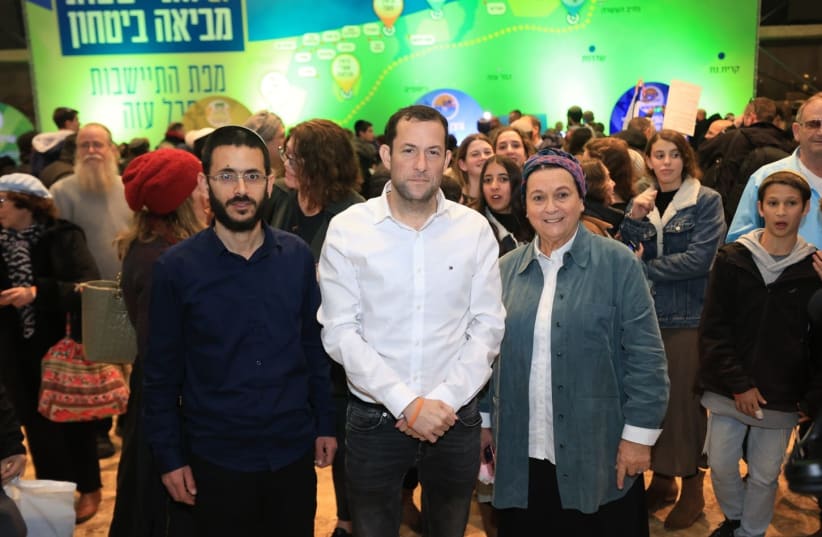
Twelve government ministers, 15 members of the Knesset, and some 3,000 people attended a conference on Sunday calling for Jewish resettlement of Gaza, according to organizers.
“Part of correcting the mistake of the Oslo Agreement, which brought on October 7, is the return of settlements to Gush Katif,” said National Security Minister Itamar Ben-Gvir as the crowd burst into applause.
The event was held at the Jerusalem International Convention Center and was organized by Nahala.
Ben-Gvir called for "return of settlements to Gush Katif" in Jerusalem on Sunday
Ben-Gvir called for the death penalty for terrorists and joined the audience as they began to shout “Death to terrorists.”
He called on Prime Minister Benjamin Netanyahu to make the brave decision to return Jewish settlements to the Gaza Strip.
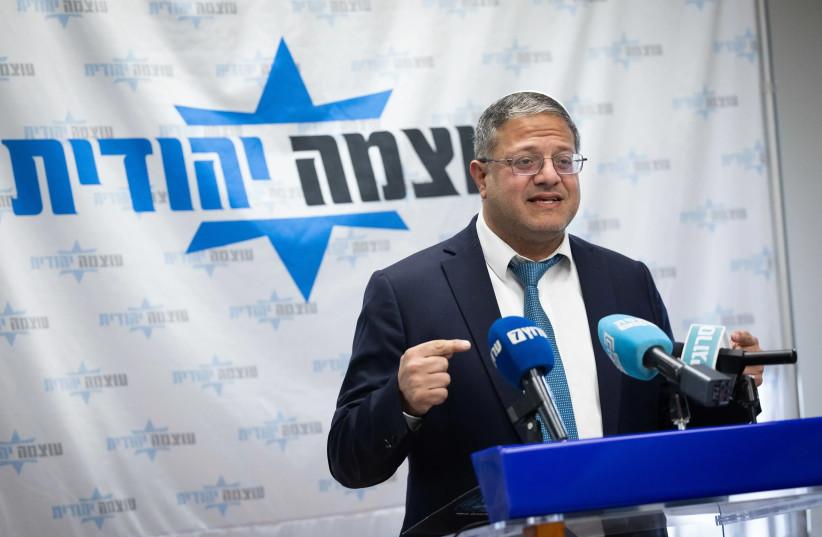 Pushing to get his plan approved in the near future. Ben Gvir (credit: Yonatan Zindel/Flash90)
Pushing to get his plan approved in the near future. Ben Gvir (credit: Yonatan Zindel/Flash90)Head of the Shomron Regional Council, Yossi Dagan, said: “After the Shoah, we suffered on October 7. The answer is only...the return to the Gaza Strip and Gush Katif. We call on the government to speak in the only language the Middle East will understand and establish settlements in the Gaza Strip. We are here to take the first step on the long journey. It will be difficult, but the only other alternative is Shoah."
“Oslo is dead. The people of Israel live,” he shouted, calling on the audience to join him in the chant.
Estonia, Japan join nine other nations in suspending UNRWA funds
UNRWA’s role has long been criticized by Israel which alleges it has supported Hamas for years, an allegation the agency denies.
Estonia and Japan joined nine other nations in suspending funds to the United Nations Relief and Works Agency in the wake of allegations that 12 of its staff members had participated in the Hamas-led October 7 massacre.
“Concerning the recent very serious allegations against @UNRWA, Estonia will not continue with the funding of the organization,” Estonian Foreign Minister Tsahkna wrote in a post on X on Sunday.
Japan’s Foreign Ministry said it was “extremely concerned by the allegations” and that it was suspending any new funding to UNRWA pending completion of an investigation.
Their statements followed suspensions by Australia, Canada, the United Kingdom, the United States, Finland, Netherlands, Germany, Italy, and Iceland.
At issue is at least $363 million in pledged funds for UNRWA towards its budget of upward of $1.6 billion for the 5.9 million Palestinian refugees it services in Gaza, the West Bank, east Jerusalem, Jordan, Syria, and Lebanon. Aside from basic food supplies, UNRWA also provides education and health care services.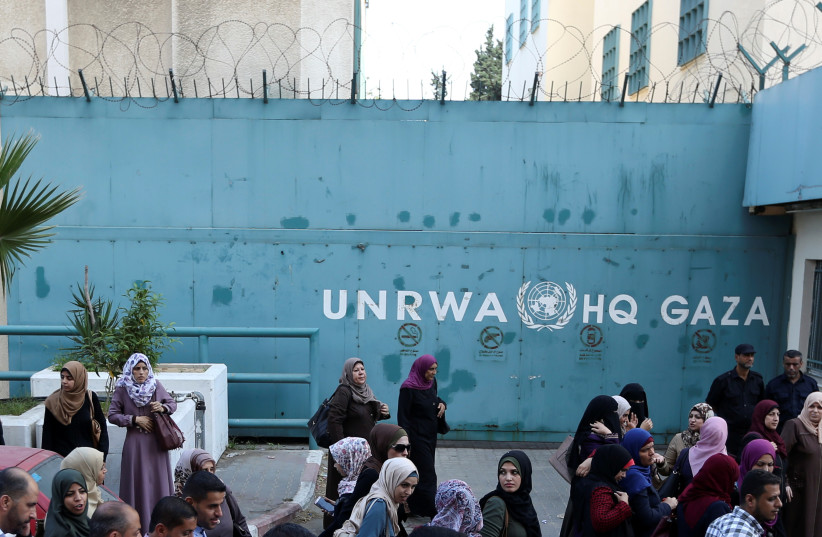
UNRWA’s Commissioner-General Philippe Lazzarini has said that the bulk of Gaza’s 2.3 million population is serviced in one way or another by the agency, a service that is particularly vital in light of the war.
UN is urging donor countries not to suspend funding
UN Secretary-General Antonio Guterres urged donor countries not to suspend funding.
“Two million civilians in Gaza depend on critical aid from UNRWA for daily survival but UNRWA’s current funding will not allow it to meet all requirements to support them in February.
“While I understand their concerns – I was myself horrified by these accusations – I strongly appeal to the governments that have suspended their contributions to, at least, guarantee the continuity of UNRWA’s operations.
“The abhorrent alleged acts of these staff members must have consequences. But the tens of thousands of men and women who work for UNRWA, many in some of the most dangerous situations for humanitarian workers, should not be penalized. The dire needs of the desperate populations they serve must be met,” Guterres stated.
Israel submitted its allegation to UNRWA privately at the end of last week and did not make the information public.
Upon receiving the complaint, Lazzarini immediately fired nine of the staff members involved. Guterres said that one of the staff members “is confirmed dead” and the identity of the two others is being clarified.”
He noted that the UN took “swift action following the extremely serious allegations” and that “an investigation by the UN’s Office of Internal Oversight Services (OIOS) was immediately activated.”
“Any UN employee involved in acts of terror will be held accountable, including through criminal prosecution. The Secretariat is ready to cooperate with a competent authority able to prosecute the individuals in line with the Secretariat’s normal procedures for such cooperation,” Guterres stated.
“UNRWA had also previously announced a full, independent review of the organization on 17 January,” he said.
Responding to Guterres’ statement, Israel’s UN Ambassador Gilad Erdan called on all donor states to suspend their support and demand an in-depth investigation into “the involvement of all UNRWA employees in terror.”
He added in a statement that Guterres’s appeal for continued funding for the agency had “proven once again that the security of the citizens of Israel is not really important for him.”
Israeli government spokesperson Eylon Levy told Reuters that to his knowledge the intelligence that led the US to cut off its funding had not yet been declassified, but that an Israeli briefing would be dedicated to this topic later in the week.
Observers and aid workers said the move by the donors would exacerbate hunger.
“Donors, do not starve children for the sins of a few individual aid workers,” said Jan Egeland, Secretary General of the Norwegian Refugee Council.
A UN-appointed expert on the right to food, Michael Fakhri, warned that the funding cuts meant that famine was now “inevitable” in Gaza.
Even before the conflict, UNRWA was struggling to secure funding and warned that it was on the verge of collapse. Many of its 13,000 staff members are refugees themselves and at least 150 have been killed since the Israel-Hamas conflict began.
Egyptian Foreign Minister Sameh Shoukry said he was “surprised” by the move to pause UNRWA funding and said it would lead to more suffering for Palestinians. The Turkish Foreign Ministry also urged countries that had paused funding to reconsider their move.
Palestinian Authority President Mahmoud Abbas accused Israel of leading an oppressive campaign against the agency. “The campaign aims to liquidate the issue of Palestinian refugees,” he said in a statement.
Senior Hamas official Sami Abu Zuhri said the Israeli accusations against UNRWA were a challenge to the International Court of Justice’s decision on Friday that ordered Israel to prevent acts of genocide in Gaza. Norway and Ireland said they would continue funding the agency.
“While I share the concern over the very serious allegations against some UNRWA staff, Norway has decided to continue its funding. UNRWA is a lifeline for millions of people in deep distress in Gaza as well as in the wider region,” Norwegian Foreign Minister Espen Barth Eide said on X, formerly Twitter.
UNRWA’s role has long been criticized by Israel which alleges it has supported Hamas for years, an allegation the agency denies.
The Israeli Right has for years called for UNRWA to be abolished, charging that its educational material incites against Israel and that it’s structured to create an ever-expanding refugee population rather than eliminating the refugee status.
UNRWA has long refuted allegations of incitement, explaining that it deals swiftly with them when they arise. It has explained that its mandate is set by the UN General Assembly and that it is responding to the geo-political reality in which it operates.
'Constructive' meeting on Gaza hostage deal ends in Paris, but gaps remain
CIA Chief William Burns, Mossad Chief David Barnea, Shin Bet Chief Ronen Bar, Qatari Prime Minister Mohammed Al-Thani, and head of the Egyptian Intelligence Services Abbas Kamel are holding talks.
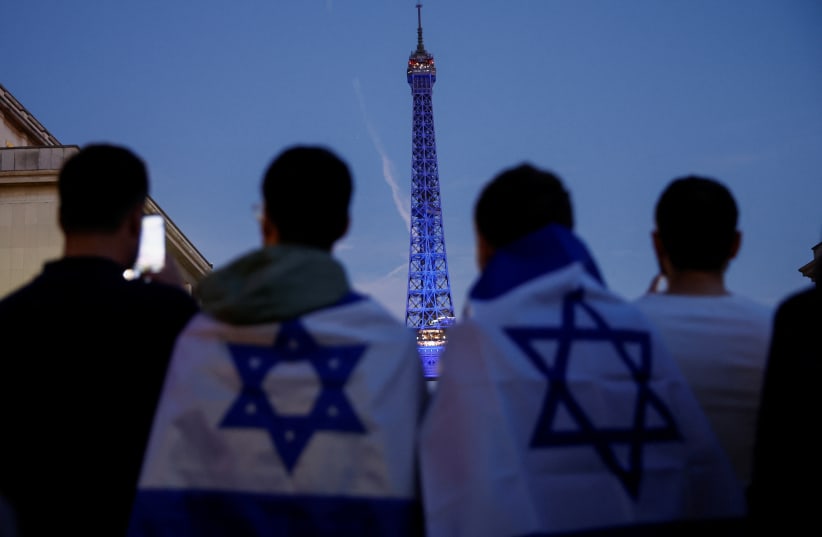
PARIS — The United States has increased its push for a Gaza hostage deal as it led a critical closed-door Paris meeting on the matter, which was deemed as positive even though gaps remain between Israel and Hamas.
“The meeting was defined as a constructive,” the Prime Minister’s Office said. It cautioned, however, that “there are still significant gaps which the parties will continue to discuss this week during additional meetings.”
CIA Chief William Burns, Mossad Chief David Barnea, Shin Bet Chief Ronen Bar, Maj.-Gen. (res.) Nitzan Alon, Qatari Prime Minister Mohammed Al-Thani and head of the Egyptian Intelligence Services Abbas Kamel participated in the meeting held at secret location.
The Qatari and Egyptian teams arrived at the French capital already Saturday, with the Israelis and Americans arriving on Sunday.
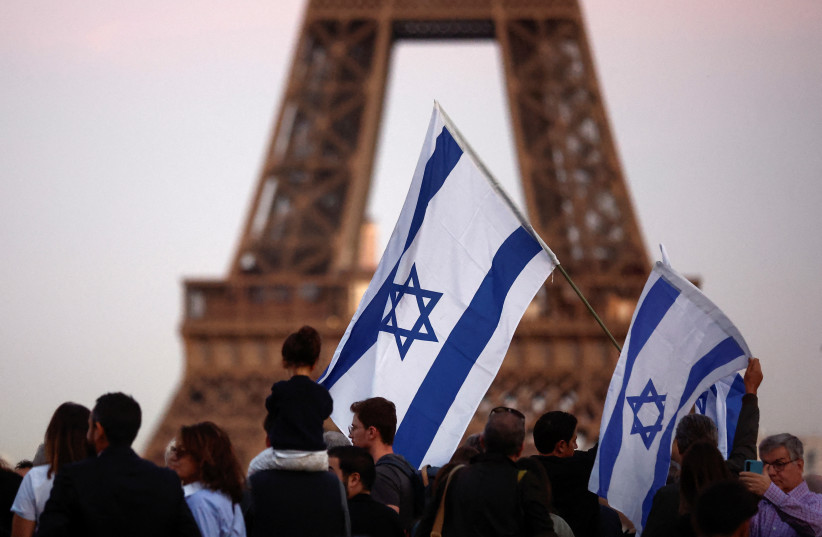
Can Israel break hostage talks deadlock?
Barnea had reportedly traveled to Qatar several times since Oct. 7. On December 16, reports said that the chief of the Mossad met with Al-Thani in Oslo, but a later report by public broadcaster Kan said the meeting took place in Paris. It is not sure yet how long the parties will stay this time in the French capital for the talks.
According to KAN NEWS, the releases would be phased and could include the release of terrorists jailed for killing Israelis and the IDF withdrawal from specific areas in Gaza, along the lines of what occurred during the first hostage deal in November.
The Israeli team had aimed to clarify to their interlocutors that they "need to apply additional levers of pressure on Hamas," to accept what Israel would consider a reasonable deal.
"The purpose of this top-level meeting is to try and initiate a move; to bring up ideas, proposals, to break the deadlock," it was said.
Reports in recent days have indicated that the sides have come closer to a deal, which should see Israel suspending fighting in Gaza for two months.
Hostages will be released in two or three phases. In the first phase, fighting will be stopped for 30 days, with women, elderly men and hostages injured or sick will be released. At the same time, Israel and Hamas will finalize the details of the second phase, during which the fighting will be suspended for an additional 30 days.
It is unclear whether female soldiers will be released as part of the first phase or apart. The last to be released would be male soldiers and the bodies of deceased hostages.
That being said, the main hurdle for a deal is the demand by Hamas that the deal will signal the complete ending of fighting in Gaza, a condition Israel rejects categorically. The proposal that Hamas leaders will leave the Strip to other countries is apparently no longer part of the deal being discussed.
Go to the full article >>Israel-Hamas War: What you need to know
- Hamas launched a massive attack on October 7, with thousands of terrorists infiltrating from the Gaza border and taking some 240 hostages into Gaza
- Over 1,200 Israelis and foreign nationals were murdered, including over 350 in the Re'im music festival and hundreds of Israeli civilians across Gaza border communities
- 136 hostages remain in Gaza, IDF says